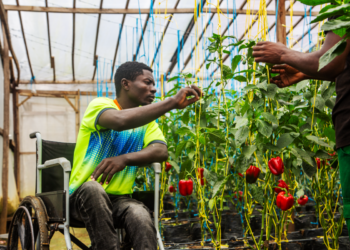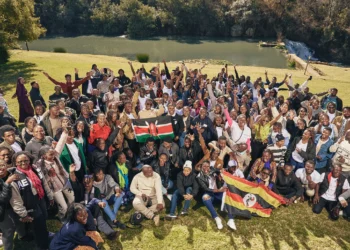
By Hilda Wamono
In June 2025, Uganda’s Sandra Nambozo and Samuel Muyita won a Community Healers’ Award worth 80 million shillings (about $22,300) and a 70 million shilling (about $19,500) prize from Heifer International for their biodegradable plant-based sachet, which extends fruit shelf life by 30 days. Recognised by the European Patent Office and the World Intellectual Property Organisation (WIPO), this patented innovation attracted global attention, demonstrating that intellectual property (IP) through innovation can transform African startups into investment magnets.
Yet, across Africa, intangible assets such as patents, trademarks, and copyrights remain underexplored due to low IP awareness, weak infrastructure, and insufficient funding.

A 9th July 2025 WIPO report notes that global investments in intangible assets grew three times faster than in physical assets like buildings. Africa, rich in talent and resources, lags behind and, as a result, is missing a critical opportunity to drive economic growth. For entrepreneurs, investors and policymakers, IP is an untapped market to fuel innovation and global competitiveness.
Intangible assets — patents, copyrights, trademarks and geographical indications — are creations of the human mind with immense economic potential.
Africa’s entertainment and agriculture industries brim with innovation but underutilise IP. For example, Uganda’s emerging film industry, Ugawood, generates over $50 million annually, as reported by Monitor Publications on 20th November 2020. By leveraging copyrights, Ugawood could protect and monetise content globally, mirroring Nollywood’s success.
Similarly, coffee from Uganda’s eastern and western regions could learn from Ethiopia’s Yirgacheffe, which has a stronger global reputation (Geographical Indications) to boost brand value and attract large markets.
Many African entrepreneurs operate in traditional non-IP-protected models, limiting their ability to scale or attract global investment. WIPO reports show that countries investing in IP through education and legal frameworks achieve faster economic growth. Africa’s creative and tech sectors could follow suit, but this requires targeted funding to unlock their potential.
IP as an untapped investment opportunity is a high-potential, low-competition investment frontier in Africa. Unlike physical assets, intangible assets like a healthtech innovation or a trademarked fashion brand can yield exponential returns. For instance, Fenix International, a Uganda-based solar energy company, leverages innovations on its pay-as-you-go model to dominate the renewable energy sector, as reported by Kalikumutima & Co. Advocates. This IP strategy has expanded its market reach and attracted investors.
Africa’s music industry further illustrates this potential. Artists like Eddy Kenzo and Nigeria’s Burna Boy use copyrights to monetise their work on platforms like Spotify and YouTube, generating significant revenue. Yet, many artists lack the knowledge to fully exploit their creations. Therefore, investors could fund platforms that streamline IP licensing, creating new revenue streams.
Similarly, startups in fintech, agritech or fashion could attract venture capital by securing patents or trademarks. By investing in these emerging markets, stakeholders can drive innovation while reaping high returns.
Barriers to IP Investment in Africa:
Several challenges hinder Africa’s IP ecosystem as discussed below;
- Low IP awareness among entrepreneurs and consumers undermines IP adoption. Many small businesses are unaware of their IP rights or how to register innovations and trademarks, leaving innovations vulnerable to misuse.
- Weak enforcement mechanisms, such as outdated laws or underfunded IP offices, deter investors. For example, Uganda’s IP laws prioritise commercialisation but lack clear provisions for accessing financing from IP assets, stalling progress. While the recent operationalisation of Uganda’s Copyright Management System aims to improve registration and compensation for creatives, broader reforms are needed.
- Africa lacks comprehensive data on IP valuation and investment, as noted in WIPO and ARIPO reports. This opacity makes it harder to attract funding compared to established markets. These barriers create a cycle: without awareness, entrepreneurs undervalue IP; without strong laws, investors hesitate; and without data, the market remains unclear. Breaking this cycle demands strategic funding and policy reform.
Funding solutions to harness IP’s Potential to unlock IP’s promise, Africa needs investment in three key areas;
- Education: Entrepreneurs and innovators must understand IP rights to protect and monetise their creations. Integrating IP education into school curricula, advocacy campaigns, and workshops can bridge this gap. For example, WIPO’s training in Egypt empowered five women entrepreneurs to register trademarks, boosting their brands’ marketability. Partnerships with the African Regional Intellectual Property Organization (ARIPO) or WIPO could scale such efforts across Africa.
- IP Infrastructure: Stronger IP offices and digital platforms for patent and trademark registration are essential. The Uganda Registration Services Bureau has introduced digital systems, but reports state that underfunding and bureaucratic delays limit their impact. Investors could support scalable solutions, like blockchain-based IP registries, to enhance transparency and attract global capital.
- Policy Reform: African governments must modernise legal frameworks to incentivise IP investment. Uganda could introduce tax breaks for startups registering their innovations or adopt IP-backed financing models, as seen in developed countries’ policies like South Korea, allowing IP as collateral. Clear policies would signal to investors that Africa is open for IP-driven business.
Investors have a unique opportunity to fund these areas. Venture capitalists could back various startups like Namboozo and Muyita’s innovation or platforms simplifying IP management. Such investments promise high returns while fostering innovation across Africa’s creative and tech sectors.
In conclusion, IP is Africa’s untapped engine for economic growth, enabling entrepreneurs to scale and attract global capital. From Ugawood’s copyrights to agritech innovations like Namboozo and Muyita’s, intangible assets hold immense potential.
Overcoming barriers through education, infrastructure and policy reform is critical. Investors should seize this low-competition market by funding IP-driven startups and systems. Entrepreneurs must prioritize learning IP rights, and policymakers must amend laws to reflect current trends that support investment in intangible assets. Together, these efforts can transform intangible assets into tangible prosperity, positioning Africa as a global innovation hub.
Ms Wamono Hilda is a Kampala-based lawyer and writer specialising in Intellectual Property and innovation. She advocates for IP rights in The New Vision, Uganda’s leading newspaper, and on LinkedIn, empowering African entrepreneurs and innovators to leverage IP for growth.










